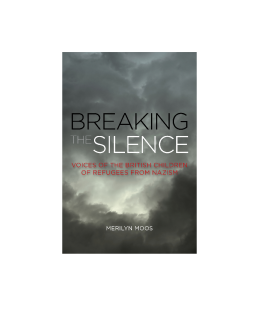
Additional Information
Book Details
Abstract
There has been extensive research into the impact of the Holocaust on the children of survivors who immigrated to the US and Israel. But very little work in this space has looked at children whose parents fled Nazi persecution before the Holocaust. Even less attention has been paid to those who ended up in Britain from Germany, Austria, Czechoslovakia and Hungary.
What was the impact on this second generation? How have the lives of these ordinary people been shaped by their parents’ dislocation? Using a series of interviews with members of the second generation, Breaking the Silence is a qualitative, interdisciplinary exploration how their lives were shaped by their parents escape from persecution. It offers an insight into how the exile and fear of persecution of the parents and the deaths/murder of unknown relatives has left this generation both bereft of memories and haunted by the past.
The key strength of the volume is Moos’s willingness to put her own experiences into the frame. As she shifts from using ‘they’ to using ‘we’ in the final section, she also shifts from the concrete to the speculative – but the thoughtful conclusions she draws here are clearly the result of a long period of very personal soul-searching, as well as an analysis of a handful of interviews; and here Moos’ passion for and investment in her subject come through clearly.
With Europe facing the worst refugee crisis since the Second World War, author Merilyn Moos’s new book Breaking the Silence is poignantly topical … The “silence” of the title is that of both parents and children. Moos suggests some parents could not bear to remember and tried to keep closed the door to the past. Or they didn’t want to speak of appalling events to their children in order to leave them with hope for the future. Perhaps silence was a feature of mourning, evidence of trauma or an assertion that words cannot bring back the dead.
It is only natural to want to know what the impact was on the second generation. How did it shape and/or alter their lives? By interviewing these now grown children, we get a look at their lives that is both qualitative and interdisciplinary. We are given an insight into how fear of persecution and exile of their parents plays into their own lives and how some are haunted by the pasts and others cannot remember because they do not want to. The children here speak in their own words and a commentary is provided that is moving and incredibly fascinating. – Amos Lassen
Merilyn Moos is an independent scholar based in London.
“In Breaking the Silence, Moos has produced a tightly focused, worthwhile piece of scholarship, of relevance to those with personal or academic interests in this area.”
This highly original study reveals the long-lasting effects of trauma for the children of exiles who came to Britain from Nazi Germany, using their own words and with a commentary that is always fascinating and often very moving.
Sue Vice, Professor of English Literature, The University of Sheffield
This is a well structured and well written study of the extent to which people from the second generation of German refugees in Britain have been affected by their parents' frequently silent suffering. The 'children', now in middle age or beyond, have frequently kept silent about it too, in some cases until interviewed by the writer for this particular book. Moos investigates the legacy of suffering, which is also her own, with great sensitivity and feeling.
Charmian Brinson, Professor of German, Imperial College London
[A]n exploratory research study which contextualises and analyses the experiences of people of the second generation, based around a series of testimonials by people from that group. Some of the most powerful stories are from people talking about the ways they faced up to topics-which-could-not-be-discussed during their everyday lives as children … The indicators of distress that [Moos] identifies among the second generation of refugees from Nazism will prove invaluable for those studying and seeking to promote the wellbeing of people who have survived any of the catastrophes of our age.
This is a very important book. It presents ground-breaking research and contains new primary material: interviews with members of the second generation. It fills the gap in a field that is, to date, under-researched in the UK.
Andrea Hammel, Senior Lecturer in German, Aberystwyth University
